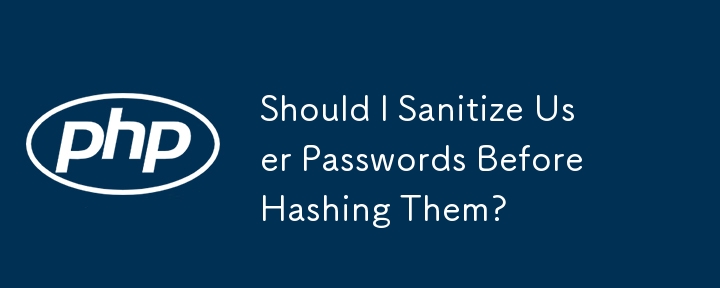Home >Backend Development >PHP Tutorial >Should I Sanitize User Passwords Before Hashing Them?
Should I Sanitize User Passwords Before Hashing Them?
- DDDOriginal
- 2024-12-22 03:32:09562browse

Cleansing User Passwords: A Comprehensive Guide
When preparing user-provided passwords for storage in a database, it's tempting to apply cleansing or escaping mechanisms. However, this approach is often counterproductive and unnecessary, especially when utilizing PHP's password_hash() function for password hashing.
Why Cleansing Is Unnecessary for Hashed Passwords
Hashing a password transforms it into a form that cannot be easily reversed or used for SQL injection attacks. The hashing function doesn't attach special significance to any specific bytes within the input, making cleansing unnecessary for security purposes.
Allowing users to employ arbitrary passwords and phrases, including spaces and special characters, ensures the hashed password's safety. PASSWORD_BCRYPT, the default hashing algorithm in password_hash(), produces a 60-character string consisting of a random salt, hashed password information, and a cost parameter.
Impact of Sanitization on Password Hashes
Different sanitization methods can have vastly different effects on passwords. Consider the password "I'm a "dessert topping" & a
- trim(): Removes trailing spaces, resulting in the loss of five spaces at the end.
- htmlentities(): Changes double quotes, ampersands, and braces into HTML entities, altering the password's appearance but not its hashed value.
- htmlspecialchars(): Similar to htmlentities(), but affects all HTML special characters.
- addslashes(): Prefixes certain characters with escape characters, which will later interfere with password verification.
- strip_tags(): Removes HTML tags, resulting in the loss of the floor wax text.
Consequences of Password Cleansing
Employing these cleansing methods introduces unnecessary complexity. When attempting to verify the password, the same cleansing method must be re-applied to the posted password before using password_verify(). Failure to do so will lead to verification failures.
If password_hash() is used, cleansing offers no additional security and only complicates the process.
Alternative Solutions
Instead of sanitizing user passwords, consider the following:
- Use PHP's password_hash() function with the PASSWORD_BCRYPT algorithm for reliable password hashing.
- Avoid using MD5 password hashes due to their vulnerability to brute-force attacks.
- Implement a password policy that encourages strong passwords.
- Regularly monitor your database for compromised passwords and take appropriate action if necessary.
The above is the detailed content of Should I Sanitize User Passwords Before Hashing Them?. For more information, please follow other related articles on the PHP Chinese website!

